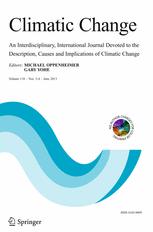Climate consequences of natural gas as a bridge fuel
- Michael Levi
- … show all 1 hide
Abstract
Many have recently speculated that natural gas might become a “bridge fuel”, smoothing a transition of the global energy system from fossil fuels to zero carbon energy by temporarily offsetting the decline in coal use. Others have contended that such a bridge is incompatible with oft-discussed climate objectives and that methane leakage from natural gas system may eliminate any advantage that natural gas has over coal. Yet global climate stabilization scenarios where natural gas provides a substantial bridge are generally absent from the literature, making study of gas as a bridge fuel difficult. Here we construct a family of such scenarios and study some of their properties. In the context of the most ambitious stabilization objectives (450 ppm CO2), and absent carbon capture and sequestration, a natural gas bridge is of limited direct emissions-reducing value, since that bridge must be short. Natural gas can, however, play a more important role in the context of more modest but still stringent objectives (550 ppm CO2), which are compatible with longer natural gas bridges. Further, contrary to recent claims, methane leakage from natural gas operations is unlikely to strongly undermine the climate benefits of substituting gas for coal in the context of bridge fuel scenarios.
-
blah
10584_2012_658_MOESM1_ESM.docx
(199KB)
ESM 1:(DOCX 199 kb)
- Alvarez RA, Pacala SW, Winebrake JJ, Chameides WL, Hamburg SP (2012) Greater focus needed on methane leakage from natural gas infrastructure. PNAS. doi:10.1073/pnas.1202407109
- Brenkert AJ, Kim SH, Smith AJ, Pitcher HM (2003) Model Documentation for the MiniCAM. PNNL Pub. 14337
- Brown SPA, Krupnick A, Walls MA (2009) Natural gas: a bridge to a low-carbon future? RFF Issue Brief 09–11. Resources for the Future, Washington, DC
- Cathles LM (2012) Assessing the greenhouse impact of natural gas. Geochem Geophys Geosyst 13:Q06013 CrossRef
- Cathles LM III, Brown L, Taam M, Hunter A (2011) A commentary on “The greenhouse-gas footprint of natural gas in shale formations” by R.W. Howarth, R. Santoro, and Anthony Ingraffea. Clim Chang. doi:10.1007/s10584-011-0333-0
- Clarke L, Edmonds J, Jacoby H, Pitcher H, Reilly J, Richels R (2007) Scenarios of greenhouse gas emissions and atmospheric concentrations. U.S. Climate Change Science Program, Washington, DC
- Clarke L, Edmonds J, Krey V, Richels R, Rose S, Tavoni M (2009) International climate policy architectures: Overview of the EMF 22 International Scenarios. Energy Economics 31(2):S64–S81 CrossRef
- Editorial (2012) Gas and air. Nature 428: 131–132 (2012)
- Howarth RW, Santoro R, Ingraffea A (2012) Venting and leaking of methane from shale gas development: response to Cathles et al. Clim Chang. doi:10.1007/s10584-012-0401-0
- Howarth RW, Santoro R, Ingraffea A (2011) Methane and the greenhouse-gas footprint of natural gas from shale formations. Clim Chang. doi:10.1007/s10584-011-0061-5
- International Energy Agency (2011) Special Report: Are We Entering a Golden Age of Gas?
- International Energy Agency (2011) World Energy Outlook 2011
- Jiang M, Griffin WM, Hendrickson C, Jaramillo P, VanBriesen J, Venkatesh A (2011) Life cycle greenhouse gas emissions of Marcellus shale gas. Environ Res Lett 6
- Kerr RA (2010) Natural gas from shale bursts onto the scene. Science 328:1624–1626 CrossRef
- Manne A, Mendelsohn R, Richels R (1995) MERGE: A model for evaluating regional and global effects of GHG reduction policies. Energy Policy 23:17–34 CrossRef
- Massachusetts Institute of Technology (2011) The future of natural gas: An interdisciplinary MIT study. Cambridge, MA
- Myhrvold NP, Caldeira K (2012) Greenhouse gases, climate change and the transition from coal to low-carbon electricity. Environ Res Lett 7
- O’Neill BC, Oppenheimer M (2004) Climate change impacts are sensitive to the concentration stabilization path. Proc Natl Acad Sci USA 101:16411–16416 CrossRef
- Podesta JD, Wirth TE (2009) Natural gas: a bridge fuel for the 21st century. Center for American Progress
- Prinn R, Paltsev S, Sokolov A, Sarofim M, Reilly J, Jacoby H (2008) The influence on climate change of differing scenarios for future development analyzed using the MIT integrated global system model. MIT Joint Program Report Series 163
- Prinn R, Jacoby H, Sokolov A, Wang C, Xiao X, Yang Z, Eckhaus R, Stone P, Ellerman D, Melillo J et al (1999) Integrated global system model for climate policy assessment: Feedbacks and sensitivity studies. Clim Chang 41:469–546 CrossRef
- Skone TJ, Littlefield J, Marriott J (2011) Life cycle greenhouse gas inventory of natural gas extraction, Delivery and Electricity Production. DOE/NETL-2011/1522
- Wigley TML (2011) Coal to gas: The influence of methane leakage. Clim Chang. doi:10.1007/s10584-011-0217-3
- Wigley TML (1991) Could reducing fossil-fuel emissions cause global warming? Nature 349:503–506 CrossRef
- Wigley TML (2008) MAGICC/SCENGEN 5.3: User Manual ver. 2.
- Wigley TML, Richels R, Edmonds JA (1996) Economic and environmental choices in the stabilization of atmospheric CO2 concentrations. Nature 379:240–243 CrossRef
- Title
- Climate consequences of natural gas as a bridge fuel
- Journal
-
Climatic Change
Volume 118, Issue 3-4 , pp 609-623
- Cover Date
- 2013-06-01
- DOI
- 10.1007/s10584-012-0658-3
- Print ISSN
- 0165-0009
- Online ISSN
- 1573-1480
- Publisher
- Springer Netherlands
- Additional Links
- Topics
- Industry Sectors
- Authors
-
-
Michael Levi
 (1)
(1)
-
Michael Levi
- Author Affiliations
-
- 1. Council on Foreign Relations, 58 East 68th, New York, NY, 10065, USA



